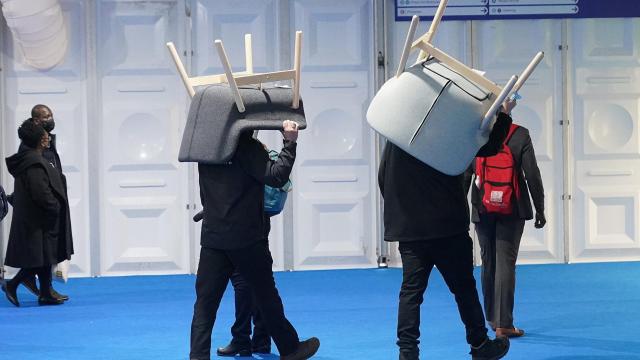The world’s leading companies are seriously overstating their plans to act on climate change, according to a report released Monday. In findings that should surprise no one, 25 firms, including Google, Unilever, and Walmart, are only on track to reduce emissions by an average of 40% — a far cry from what’s suggested by popular terms like “net zero” and “carbon neutral.”
The analysis comes from the New Climate Institute, an organisation based in Germany, which partnered with CarbonWatch to comb through the carbon-neutral or net-zero plans of some of the world’s leading organisations, giving each of them an “integrity” rating. None of the companies surveyed hit the highest integrity grade possible in the report, and only one, Danish shipping giant Maersk, got the second-highest “reasonable integrity” rating. Apple, Sony, and Vodaphone followed with “moderate integrity” ratings. Companies including Amazon, Google, IKEA, Volkswagen, and Walmart got “low integrity” scores, while 10 companies, including CVS Health, Nestlé, and Unilever, bottomed out with the lowest ranking.
“We set out to uncover as many replicable good practices as possible, but we were frankly surprised and disappointed at the overall integrity of the companies’ claims,” Thomas Day of NewClimate Institute, lead author of the report, said in a release. “As pressure on companies to act on climate change rises, their ambitious-sounding headline claims all too often lack real substance, which can mislead both consumers and the regulators that are core to guiding their strategic direction. Even companies that are doing relatively well exaggerate their actions.”
Nearly all of the companies surveyed — 24 out of 25 — are relying heavily on offsetting credits to reach their net-zero targets, a process that has problems of its own. Two-thirds of those 24 companies currently lean heavily on offsets based on reforestation, planting trees, and other land-based activities — which, as the report points out, can be impacted or reversed by something as simple as a forest fire — to reach their net-zero targets. And policies around offsets don’t necessarily hold steady through an entire company. Nestlé and Unilever, both enormous multinational brands, “explicitly distance themselves” from offsetting at the top level, the report found — but do encourage brands they own to pursue investing in offsets, in many cases in order to sell products that can be labelled “carbon neutral” while the company pursues relatively minor emissions cuts.
“It can be misleading for a parent company to distance itself from a contentious approach, if it may in fact profit from supporting its consumer facing brands to pursue that approach,” the report reads.
The report pulls back the curtain on the variety of tricks and fudgy maths that big companies are chasing in order to bill themselves as responsible on climate. Take IKEA, for example — which, by the way, was one of the most visible sponsors of the recent UN climate summit in Glasgow. The company has a target to be what it calls “climate positive” by 2030 — cutting more emissions than its emits — but plans to hit that target, the report says, are “potentially misleading” to consumers. The short-term pledge only entails a 15% reduction in the business’s actual emissions, while much of the rest is based on a jumble of offset plans and mathematical hoop-jumping. IKEA claimed an offset, for instance, from the sale of solar panels in 11 different markets in 2021. As the report details, it’s not clear whether or not those sales were simply responding to market demand for renewable energy or represent an actual investment in which IKEA is helping to bring solar power to new regions.
IKEA’s plan also claims that, by refurbishing used furniture instead of creating new products, IKEA is storing CO2 in the furniture. “Carbon dioxide removals can only be considered a credible neutralization of a company’s emissions if the storage has a high certainty of permanence,” says the report. “IKEA recognises that by storing carbon in its products, it will delay their release into the atmosphere by on average just 20 years. The release of stored carbon negates any climate impact from the original sequestration.”
As capitalism catapults us all toward ecological disaster, it can be heartening to see companies making public commitments to help slow down climate change. But this report is a sobering reminder to check the maths, and to remember that the idea of “net zero” is often absolute bullshit.
